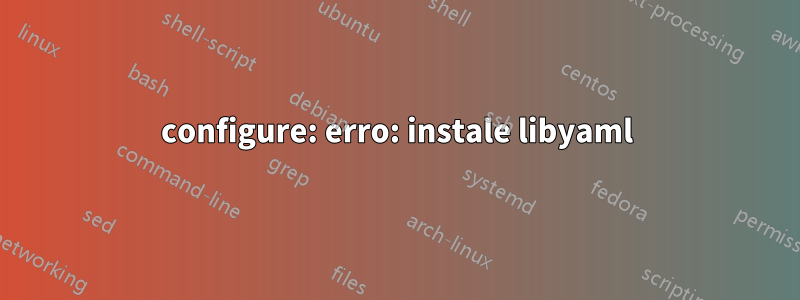
Estou acompanhando a instalação doNoções básicas de análise YAML em PHPpara instalar YAML para PHP no Fedora 20.
Eu passei por todas essas etapas:
wget http://pecl.php.net/get/yaml-1.1.0.tgz
tar -xvzf yaml-1.1.0.tgz
cd yaml-1.1.0
phpize
./configure && make && make install
Mas o último não funciona:
# ./configure && make && make install
checking for grep that handles long lines and -e... /bin/grep
checking for egrep... /bin/grep -E
.../...
checking for re2c... no
configure: WARNING: You will need re2c 0.13.4 or later if you want to regenerate PHP parsers.
checking for gawk... gawk
checking whether to enable LibYAML suppot... yes, shared
checking for yaml headers... not found
configure: error: Please install libyaml
Ao receber a mensagem "Por favor instale o libyaml", verifiquei se ele está instalado... e está!
# yum list installed | grep yaml
libyaml.x86_64 0.1.6-1.fc20 @updates
yaml-cpp03.x86_64 0.3.0-4.fc20 @anaconda
E, claro, se eu criar um arquivo php com uma chamada para yaml_parse_file(), recebo o erro:
Fatal error: Call to undefined function yaml_parse_file() in XXXfile on line YYY
O que pode estar faltando?
Responder1
Você deve instalar o libyaml-dev, não o libyaml. No CentOS, eu instalei com sudo yum install -y libyaml-devel.x86_64.
[vagrant@localhost yaml-1.2.0]$ yum search libyaml
============================================
N/S Matched: libyaml
============================================
libyaml-devel.i686 : Development files for LibYAML applications
libyaml-devel.x86_64 : Development files for LibYAML applications
libyaml.i686 : YAML 1.1 parser and emitter written in C
libyaml.x86_64 : YAML 1.1 parser and emitter written in C
Responder2
Ah, isso não era para terminar assim, mas encontrei uma solução atravésComo instalar com Pecldocumentação no Code Google:
- Instale LibYAML usando seu método favorito. Por exemplo, em uma máquina Ubuntu
sudo apt-get install libyaml-devvocê terá o que precisa. sudo pecl install yaml-beta- Edite suas configurações do php.ini e adicione
extension=yaml.so - Veja se funcionou com
php --re yaml
Como estou no Fedora, tive que usar uma abordagem um pouco diferente:
# yum search yaml | grep -i php
php-symfony-YAML.noarch : The Symfony YAML Component
php-pecl-yaml.x86_64 : PHP Bindings for yaml
php-symfony-yaml.noarch : Symfony Yaml Component
php-symfony2-Yaml.noarch : Symfony2 Yaml Component
php54-php-pecl-yaml.x86_64 : PHP Bindings for yaml
php56-php-pecl-yaml.x86_64 : PHP Bindings for yaml
syck.i686 : YAML for C, Python, and PHP
syck.x86_64 : YAML for C, Python, and PHP
syck-php.x86_64 : YAML module for php
Então eu instalei php-pecl-yaml.x86_64:
# yum install php-pecl-yaml.x86_64
Eu adicionei a linha ao meu php.iniarquivo, reiniciei o Apache por precaução e agora recebo uma boa saída de:
# php --re yaml
Extension [ <persistent> extension #16 yaml version 1.1.1 ] {
- Dependencies {
Dependency [ date (Optional) ]
}
- INI {
Entry [ yaml.decode_binary <ALL> ]
Current = '0'
}
Entry [ yaml.decode_timestamp <ALL> ]
Current = '0'
}
Entry [ yaml.output_canonical <ALL> ]
Current = '0'
.../...
Function [ <internal:yaml> function yaml_emit_file ] {
- Parameters [5] {
Parameter #0 [ <required> $filename ]
Parameter #1 [ <required> $data ]
Parameter #2 [ <optional> $encoding ]
Parameter #3 [ <optional> $linebreak ]
Parameter #4 [ <optional> array $callbacks ]
}
}
}
}


